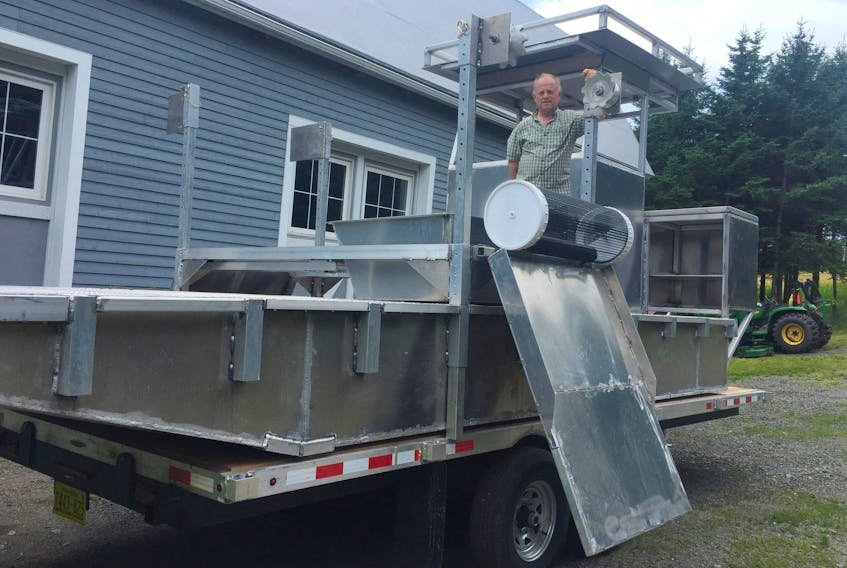A proposed oyster farm for Antigonish Harbour is raising eyebrows.
Behind the business is Lindsay Construction's former chairman Ernie Porter, his wife Jane and two sons.
The mostly retired engineer resides with Jane in a house they built themselves on Town Point, looking out over the harbour.
“The normal trajectory is that you raise your kids, they start a career, go away and come home at Christmas,” said Porter on Monday.
“This for us is an opportunity to be together as a family.”
But the Porters aren’t the only residents on Antigonish Harbour
“The seizing of the commons for the benefit of one family is very distasteful to me,” said his neighbour on Town Point, Peter Bowler.
“And the notion that shellfish aquaculture is all good news is wrong.”
Bowler is a member of the group Friends of Antigonish Harbour, which was formed to fight the oyster farm proposed by the Porter family’s company, Town Point Consulting.
They argue the farm could have a negative environmental impact on the harbour, would restrict recreational boaters from areas being farmed, will be an eyesore and depress land values.
Porter proposes to use two shallow water sites, outside of the main channel but near the mouth of Antigonish Harbour, to raise oysters in one-metre-by-35-centimetre floating plastic mesh cylinders. The cylinders will be roped together one to two metres apart in long rows held fast by moorings on either end. The rows of black floating cylinders will be six metres apart.
The technology for the floating oyster cylinders was developed by Porter and Merigomish oyster farmer Philip Docker.
A third site in a small cove beside his house on Town Point will be used to hold oysters in the winter so that they can be easily accessed for harvesting and sale.
The three sites encompass 57 hectares of the harbour.
“You would be able to kayak or row or standup paddleboard through the leases but not use a power boat or sail boat through them,” said Porter.
The marine element would work in conjunction with two land-based facilities:
A 31-metre-long, waist-height concrete nursery that circulates harbour water through a series of cylinders containing juvenile oysters.
A 5,000-square-foot building where harvested oysters would be flushed with filtered harbour water, sorted, packaged and put into cold storage.
Porter wanted to put the latter building on his own property along with the nursery, but he is looking at other potential properties on the harbour due to concerns raised by his neighbours.
He has been going door-to-door describing his proposed project around the wide harbour and claims to have now spoken with 120 area residents.
“The vast majority have been supportive,” said Porter.
The group Friends of Antigonish Harbour also claim broad support for their position.
Heather Mayhew, a member of the group and a biologist, lives farther up the harbour and worries about potential environmental impact of the project.
“I look at the harbour as a delicate ecosystem that is quite shallow and has already suffered significant human impact,” said Mayhew.
“The eel grass beds are just starting to recover from that impact.”
She argues that the impact of shellfish aquaculture on estuaries is poorly studied.
Jon Grant, NSERC-Cooke industrial research chair in sustainable aquaculture, meanwhile argues that shellfish aquaculture has been shown to have a net positive impact on estuaries.
Unlike fin fish farms, oysters don’t get fed or treated. They are filter feeders that consume the phytoplankton in the water column.
“It’s not to say they have zero impact,” said Grant of the farms.
“But they’re filter feeders so they clean the water.”
Watching the debate occur over the proposed oyster farm and confusion over what it would look like, St. Francis Xavier University biology professor David Garbary decided to host a public discussion.
The event will be held Aug. 13 at 6:30 p.m. at the auditorium in the Gerald Schwartz School of Business and will include Mayhew and Porter in a panel discussion that will be followed by public questions.
“I’m hoping this panel discussion will clear the air in terms recognizing people do have legitimate concerns, but on the other hand here we have a legitimate commercial proposal to utilize a portion of the harbour,” said Garbary.
Porter hopes to file his final application, including the public consultation portion, with the province in September.









